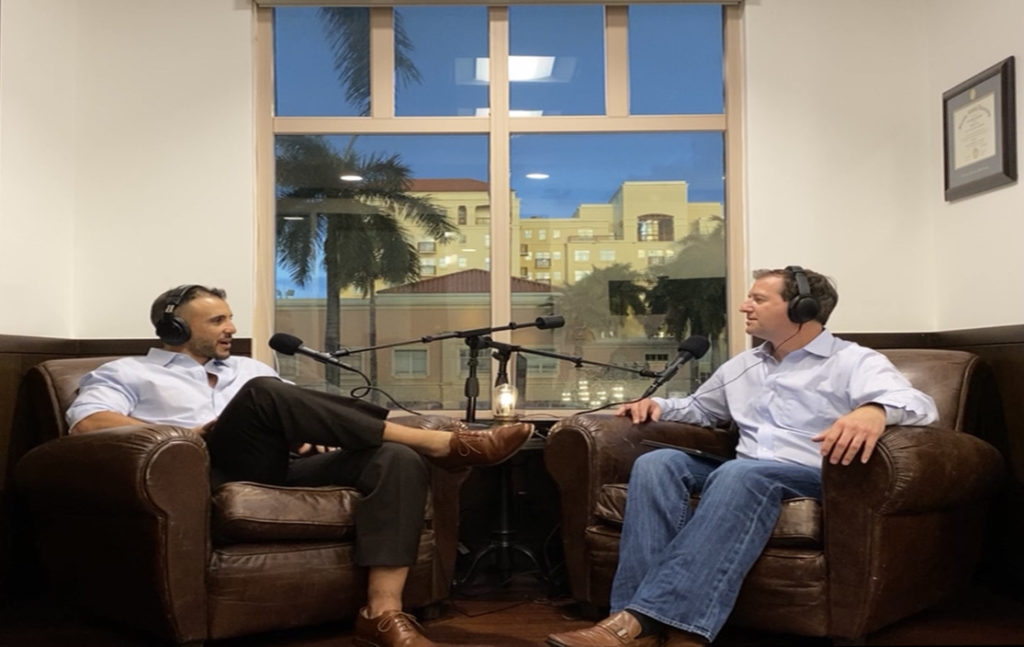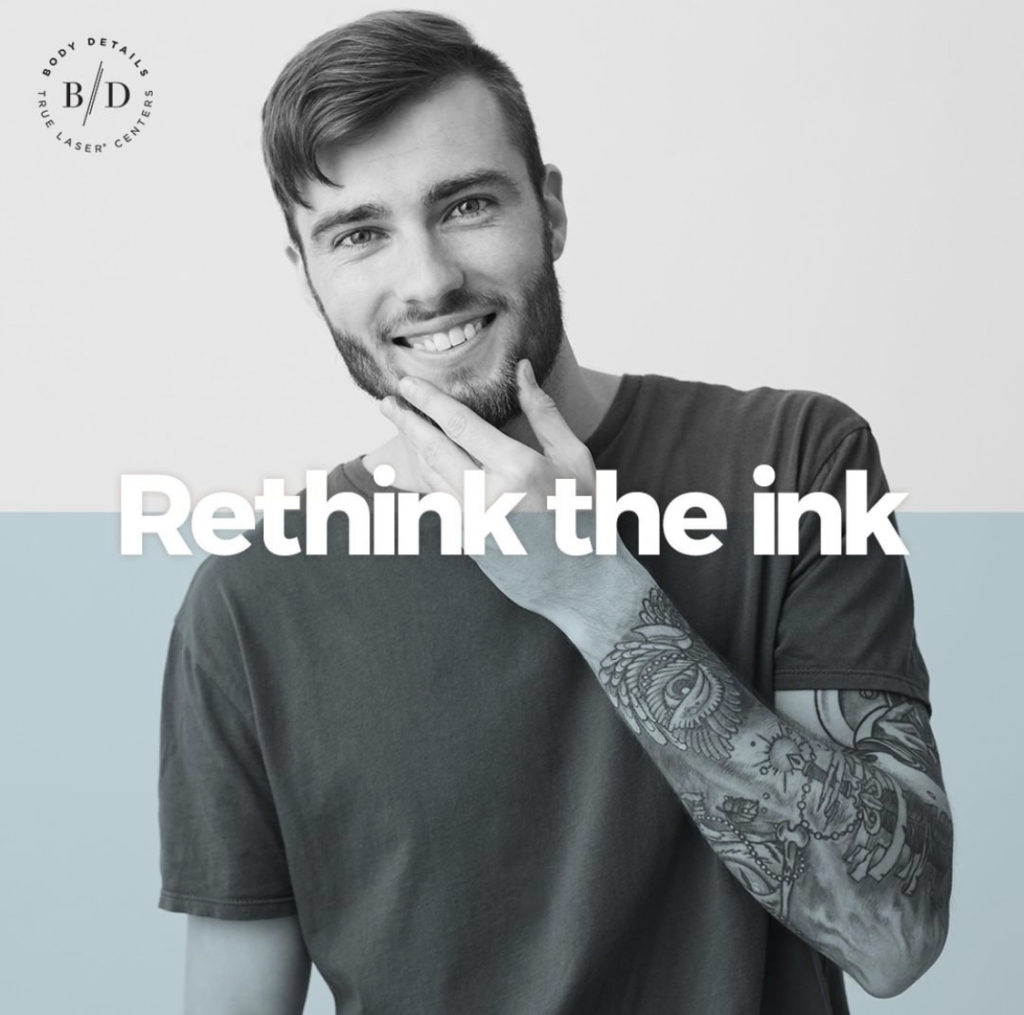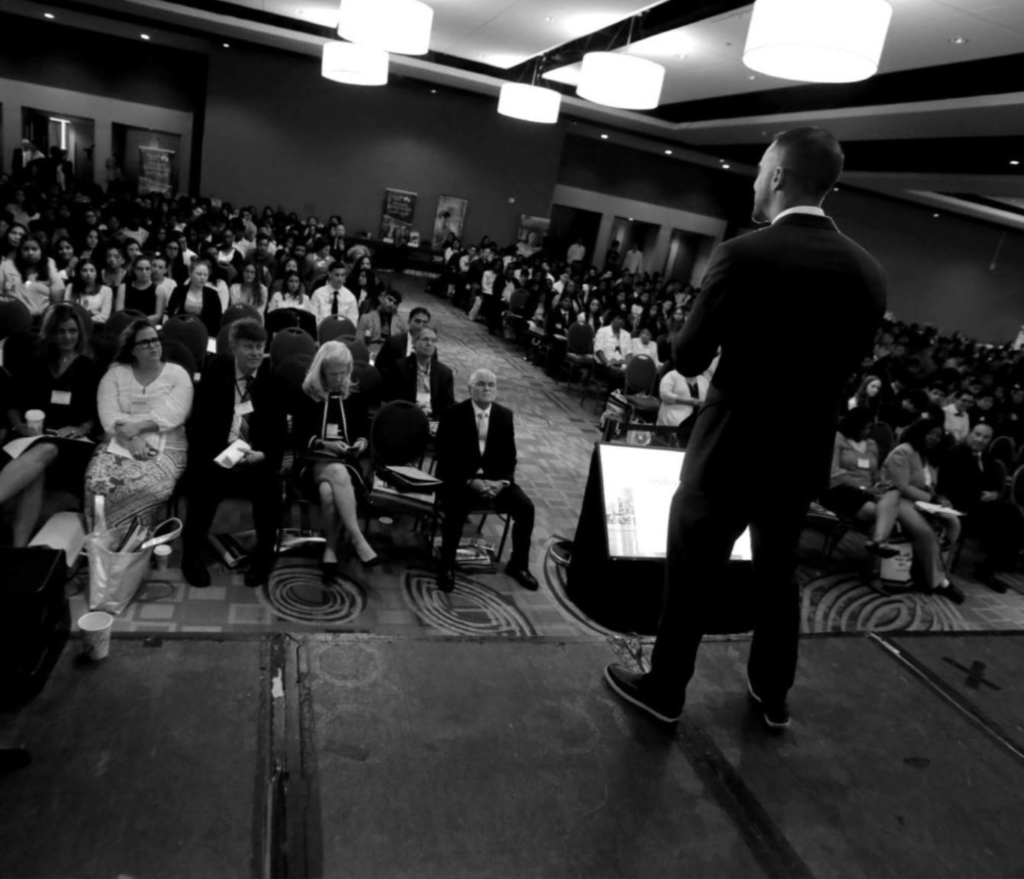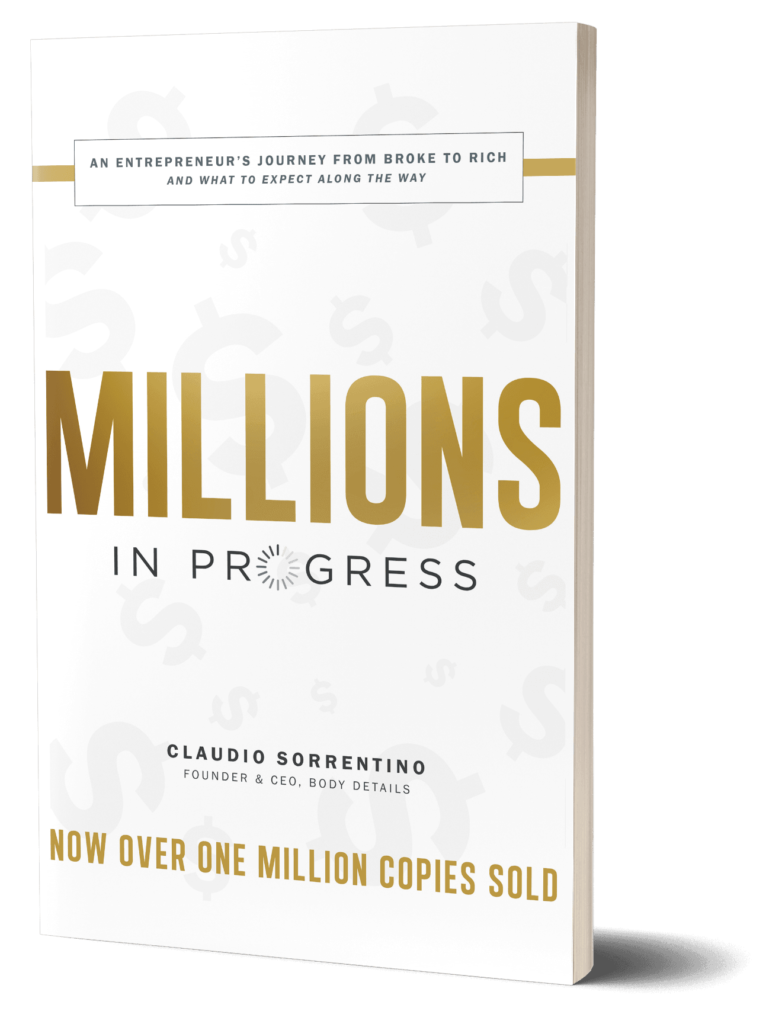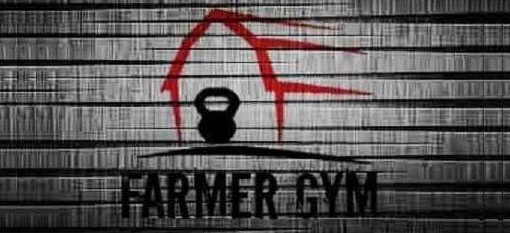Claudio Sorrentino is the co-founder and CEO of Body Details, a laser hair removal and tattoo removal company, with fifteen locations around Florida, and with headquarters in Boca Raton. Claudio was born and raised in Miami Beach and is a graduate of Florida Atlantic University, where today he is an entrepreneur in residence as part of FAU’s veteran’s program. Through this effort, he helps military veterans who are coming out of previous conflicts and military service with their business plans as they launch their own entrepreneurial ventures.
Claudio and his business partner Bryan Ballejo met in college. Both grew up in low-income households led by single mothers. During college, Claudio and Bryan started a promotions company for nightclubs. After graduation, Ballejo found his way into a great job in the corporate world. Sorrentino became a bartender while he began to work his way through a master’s degree.
Claudio was always into fitness. While he was building his body, he didn’t like the body hair that came natural to him, as a son of Italians and Brazilians. He didn’t have a lot of discretionary funding to get his body hair removed, so he found a company to hire him – and one of the benefits was laser hair removal.
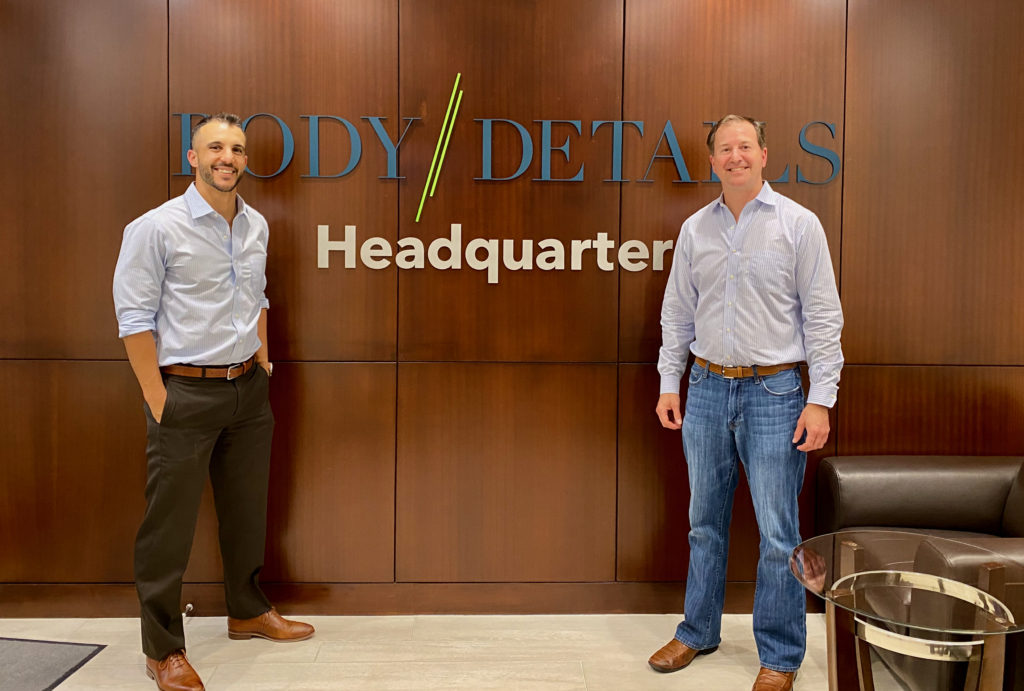
“In the process of getting that service, I realized this business is a phenomenal business,” said Sorrentino. “Everyone who is coming in there is interested. It was growing. People were highly excited about the fact of never having to shave again. And then I constantly had customers coming in and asking us about tattoo removal and services that weren’t being offered at the location I was at. So I thought to myself: is anyone doing tattoo removal in the area? And there was only one doctor in Fort Lauderdale and he only spent fifty percent of his time here. He came from New York.”
Sorrentino realized “we could corner this market.” While laser surgery like this had been around a while, not many people were doing it popularly. So, he wrote a business plan and tried to make it happen.
He called his friend Bryan who had also recently found the entrepreneurial itch. Bryan had an idea to start a pest control company. Claudio persuaded him on laser body hair removal and tattoo removal. Once Ballejo learned more about it, he loved the idea. They went back to their old college library at FAU to use the resources to research how to write a business plan and persuade investors to help them.
“We were both broke, didn’t know anyone with money, didn’t really associate with anyone with money,” said Sorrentino. “We needed about $600,000 to start the business.”
“I decided to pitch the person who I knew would be my harshest critic and destroy anything I wrote in there and if it was bad, he would tell me in a heartbeat – and that was my dad. My father has never liked any idea I’ve come up with,” said Sorrentino. “It was the harsh critic that I needed.”
“We pitched him,” said Sorrentino. “And shockingly, he loved it. It was the first thing I ever pitched him that he thought really had legs.”
His dad called a friend in New York and convinced him to come down and hear his son’s business plan. After his dad’s friend heard the pitch two weeks later, they both decided to invest in the business and they invested a combined $375,000.
“It was mind-blowing,” said Sorrentino, who didn’t expect this response from his dad. “It wasn’t any special treatment. We were going to split the business four ways and we were going to pay them back on their investment before any distributions were taken.” Claudio and Bryan decided to open the business with the capital funds they now had.
Claudio’s advice for those writing business plans: keep it simple. “People don’t want to read a book,” he said. “They want bullets and they want data.” Investors want to know why they should believe you. Back it up sufficiently with support.
Sorrentino and his business partner had a business plan, but they are not medical professionals. They also do laser fat removal. All of these services require doctors and nurses to be on-site and involved in the laser surgeries. So, they also needed to persuade medical professionals working under their leadership to trust them.
“I think it’s important when people think about starting businesses of any kind – it’s very easy to see the obstacle and then get stuck,” said Sorrentino. “Real entrepreneurs who are successful – there are always obstacles – but you tend to ignore them. You have to get to a point where you see the obstacle but your sight of the goal blinds you to it.”
One other immediate obstacle he had was getting past the non-compete agreement he had signed with his previous employer, which did similar work. To avoid any issues in the non-compete agreement, they decided to open the business over 10 miles away and Sorrentino was not officially a partner in the business for the first two years.
“If you don’t start a business because another business exists, there would be no KFC, no burger joint other than McDonald’s, there would be no Pepsi, there would be nothing,” said Sorrentino. “Almost every business out there is some modification of a prior business.”
“I don’t view competition as an issue like most people do. If you’re in a space that’s growing that has a lot of opportunity, everybody can win.”
They opened their first location in Coral Gables in 2006. The first year they opened the store for 12 hours per day, six days per week, and commuted more than an hour each way from Boca Raton. They did over $900,000 in sales their first year. They then opened a second location in Aventura – and they started doubling in size every year.
Then the recession occurred in 2008. “We hunkered down to survive.”
When the economy rebounded, they continued to raise more money in successive cycles. Body Details has 12 locations today across South Florida, with 56 employees. They will soon be expanding into the Tampa and Orlando markets. They expect continuous expansion going forward. Body Details is not only a majority female company, but 53 of their 56 employees are female.
Claudio and Bryan are once again in an aggressive growth mode, with approximately 30% of their budget in advertising and marketing. One of the other challenges of this business is that once a patient has had their hair or tattoos removed, they are non-recurring customers, so this makes continuous investments in advertising and marketing essential.
When they do come in contact with customers who are celebrities or influencers, they may offer them complimentary services in exchange for using their images for marketing services. “We don’t have any relationships with paid influencers, but we get a lot of people that contact us … most of it comes from organic demand … who are interested in our services,” said Sorrentino.
They initially faced challenges in the early weeks and months of the COVID19 pandemic in the spring of 2020. “For seven weeks, every one of my stores were shut down by the governor’s order,” said Sorrentino. “We didn’t know if it was going to be 12 weeks, if it was going to be five months. We had no clue.”
This was the second time in their 15-year history that all sales stopped, but they still had to pay all their bills. They furloughed 46 employees but kept communicating with their customers via social media and their call center. “We were very blessed that our customers were very happy to stick with us and knew this would be short-lived.” They rehired everyone except for two employees who decided not to return.
In some ways, they are now benefiting from COVID19 as they have many customers who are not going out as much or spending money on travel, and using that discretionary income for services like theirs. In addition, being based in Florida is advantageous as Florida businesses like Body Details are seeing so many new customers because of the amount of people moving to Florida from more locked down states.
Sorrentino has learned that one of the biggest challenges in any business is dealing with people. “It’s hard to lead teams. People can be very challenging,” said Sorrentino. “I think every strong leader today needs to be capable of interacting with different personalities and managing communication around different people. Everybody learns differently. Everybody hears things differently.”
“If you are someone who needs encouragement or needs a pat on the back or who needs to celebrate wins – don’t be an entrepreneur,” said Sorrentino. “It’s the loneliest position you’ll ever be in. You won’t relate to most people on a lot of things.”
“When you leave as an employee, you go home and your life is your life. An entrepreneur never gets that luxury. My business is in my head, night and day, 24 hours a day. I go to sleep, I dream about this business,” said Sorrentino. “It’s an extremely heavy position to be in. I think that’s a big challenge that people don’t expect: the mental toll it takes.”
“There’s two types of entrepreneurs,” said Sorrentino. “There’s those who find something that they just live, breathe, and emote, and need to do every day – which is awesome,” said Sorrentino. “Then there are others, who like myself, when I started this business, who just can’t work for anyone else. I’ve never been good working for someone else.”
“They say an entrepreneur is someone who will work 80 hours a week to avoid working 40 hours a week,” said Sorrentino. “While I may work more than most, I work on my own terms.”
While he was the kind of entrepreneur who simply couldn’t work for someone else, he says, “Now I’ve learned to love the creation of it. That drives me at this point now. I’m enthralled with the idea of growing this company and seeing people work here.”
His advice for those aspiring to be entrepreneurs: “If you can find the thing that gives you the lifestyle you want and the passion you want, it’s a home run. You’re going to be ultimately successful,” said Sorrentino. Because when it’s hard and when things suck and you’re absolutely miserable and you don’t want to get up in the morning, but because you still love what you’re working towards, you’re going to do it. That’s the hard part. That’s when people quit.”
Claudio says that at Body Details, “we really try to hire culture – and if you are a strong culture fit, we try to give you every opportunity to grow,” said Sorrentino. There are many examples of promotion within. “We try not to recruit outside unless it’s ultimately necessary.”
Body Details is also philanthropically involved in the communities they serve. “We do a lot of service donations for raffles and auctions to every local organization under the sun,” said Sorrentino. “A lot of charities approach us … we’re just truly happy to be a part of the community in that sense.”
Claudio seems to be a natural entrepreneur. His first job in life was as a busboy at his father’s restaurant. He wanted to scuba dive and couldn’t afford it. So, he asked his dad for an opportunity to work. His father didn’t want anyone to think there was any nepotism, so he was extremely hard on him. “I was more servant than busboy,” said Sorrentino.
While his friends were out having fun, Claudio worked 12-hour days, every day, all summer long. He made $2,600 and bought all his own scuba diving equipment on his own. “It was a great and rewarding experience that allowed me to tie the mentality that hard work yields results.”
There are two key factors that he thinks makes him a natural entrepreneur. Most people see a problem and either cannot see a solution, or if they do see a solution, they don’t pursue it. “The entrepreneur can’t not pursue it,” said Sorrentino. “So when I see a problem and see a solution, I immediately try to pursue that solution and see if it’s viable … and if I find that there’s some path to pursuing it, solving that problem, and making money doing it, I’m in.”
Entrepreneurship wasn’t exactly in his sights as he entered college. He knew the safe choice was working for someone else, and given his upbringing in a low-income household, he didn’t even think of the possibility of owning his own company. “It’s hard when you’re growing up and broke to think: I’m going to start a company,” said Sorrentino. “Even if we were great at the idea of it, we had no idea how we were going to get the capital.”
Today, Claudio’s success as an entrepreneur has made him an agent of innovation who is often called upon to speak at corporate conferences, and schools, and for civic organizations. He is also now working on a book with the tentative title, Millions in Progress.
“Most of the books I’ve read around entrepreneurship are two kinds. You either get the person who is end of life and it’s a biography and they are talking about everything they’ve done,” said Sorrentino. “Or you get those very early-stage books by those people who are basically charlatans. They have done nothing, achieved nothing, and wrote a book to try to make money off a book.”
“I wanted to give people a better insight into the realities of entrepreneurship, into the struggles of entrepreneurship, and to what it’s actually like in the middle of it… I think people need to know what it’s really like. I think people need to hear the real story. The book talks about those things, sort of our journey in building this business, and everything you can expect along the way, and any tips I can give you to help mitigate you from suffering from some of the pitfalls we suffered from in that progress. It’s truly an in-progress book. I think it will either inspire some to get into it or make others stay where they are and stick with a career path that they feel is more capable for their mental health.”
“One of the fundamental things that everyone can work on at home is building a sense of self-confidence because you are going to suffer mentally starting a company. You just are,” said Sorrentino. “If you are someone who cannot pick yourself up and convince yourself to move forward on your own with no one helping you and no one supporting you, you’re not going to make it. It’s really hard.”
“The entrepreneurs who make it are the ones who have gone through all those trials and tribulations and don’t give up,” said Sorrentino. “There is not a single successful entrepreneur I have ever met who didn’t have moments of complete abject failure.”
Claudio recited a statistic that “98% of businesses fail in the first five years.” Then he added: “But do you know how many second businesses succeed of entrepreneurs who fail and try again and then succeed? Over 80 percent,” said Sorrentino. “So, if you knew what your odds to succeed the second time around were 80 percent, maybe you would. But do you know how many entrepreneurs try the second time? Almost none. Failure hits you so hard, you don’t try. But everything you learned in that failure gives you such an opportunity and such a high likelihood of success, that all you had to do was try again and you would have made it. What you learn is going to make you so good that the next time you are going to win – and you just have to have faith.”
Throughout his entrepreneurial journey, Claudio Sorrentino constantly seems to be turning problems into opportunities. “Necessity breeds innovation,” said Sorrentino. “Discomfort is the motivator of change.”
“You have to be in a place where something goes wrong and then you solve that problem,” said Sorrentino. “Every great business on the planet has done that.”
“It’s always the problem that leads to innovation. And so people need to stop seeing problems as these horrible things and start seeing problems as the opportunities in their lives.”
You can listen to the full interview with Claudio Sorrentino of Body Details on Episode 90 of the Agents of Innovation podcast, on Apple podcasts, Amazon podcasts, Spotify, Stitcher, and SoundCloud. You can also follow the podcast on Facebook, Instagram, or Twitter.
Please consider supporting the Agents of Innovation community by becoming a member of our Patreon page today, starting at just $5 a month!

